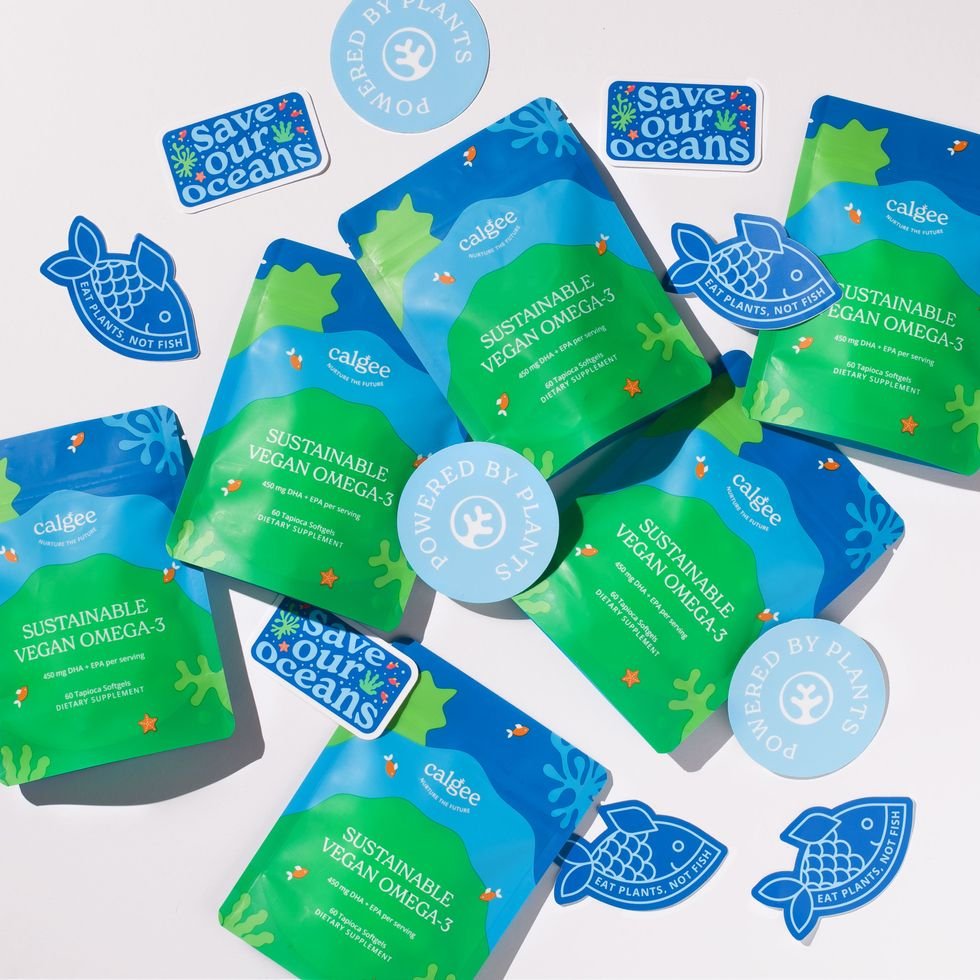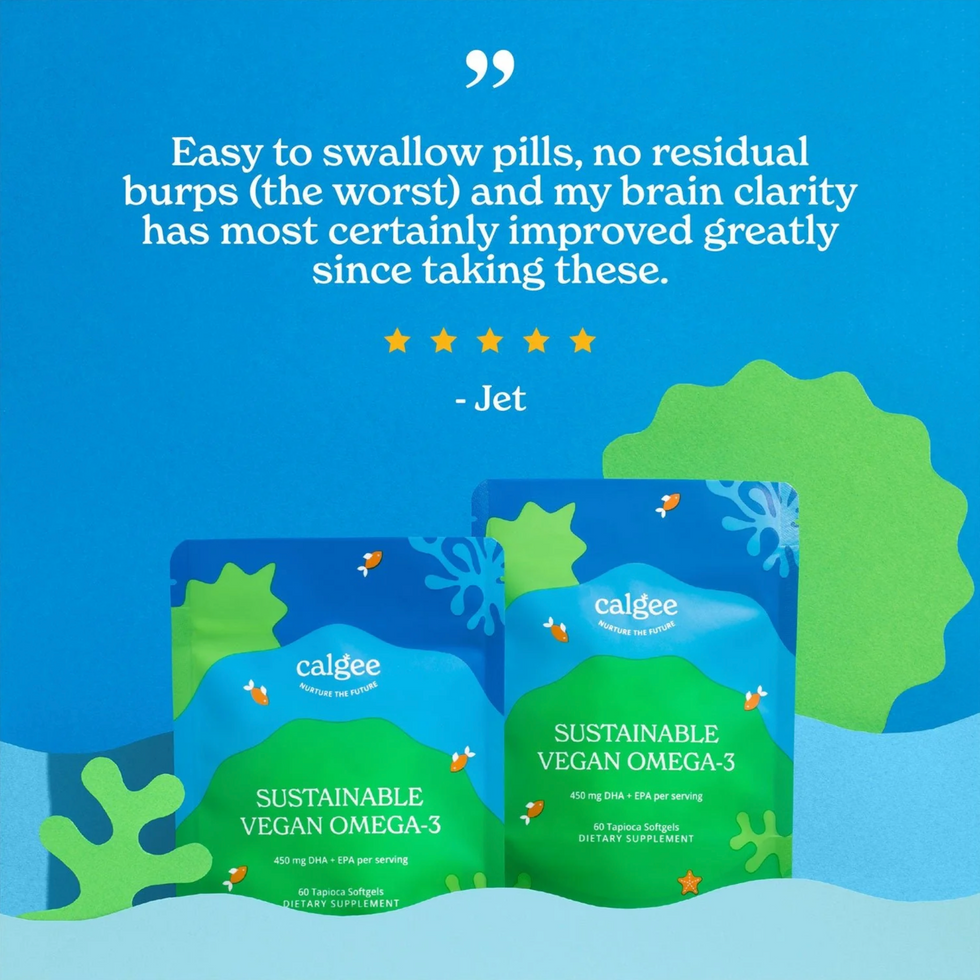Editor’s Note: Calgee is an affiliate partner of Upworthy and we earn a portion of revenue from these partnerships.
Omega-3 supplements have become increasingly popular due to their numerous health benefits. They are a rich source of essential fatty acids, which are crucial for maintaining overall wellness. They also improve brain function, reduce inflammation, and lower the risk of chronic diseases. The problem is the current method for producing Omega-3 supplements relies heavily on unsustainable fishing practices. In fact,
approximately 50 fish are killed to produce a single bottle of traditional Omega-3 supplements. But a company called Calgee is revolutionizing the market by providing sustainable, ethically sourced Omega-3 supplements made from algae.
Benefits of Omega-3s
Omega-3s are essential fatty acids that the human body cannot produce. They are crucial for maintaining the health of the brain, heart, and joints and can reduce inflammation and lower triglyceride levels. Studies have also shown that omega-3s may even reduce the risk of chronic diseases such as heart disease, diabetes, and arthritis.
Unlike traditional omega-3 supplements sourced from fish that feed on Omega-3-rich plants, Calgee’s supplements are made directly from algae, a plant-based source that is both sustainable and eco-friendly.
Calgee’s supplements are also vegan-friendly, making them a conscious choice for those who want to avoid consuming animal products. With its innovative and sustainable approach to wellness, Calgee is quickly becoming a leader in the supplement industry.
The Importance of Sustainability
Sustainability is an important concept that involves meeting the needs of the present without compromising the ability of future generations to meet their own needs. Sustainable products are produced using environmentally-friendly practices and materials. With the increasing awareness of environmental issues, choosing sustainable products to reduce our impact on the planet has become more important than ever.
Fishing practices that are not sustainable can have a devastating impact on marine ecosystems. Overfishing, for example, can cause the depletion of fish populations and disrupt the balance of the marine food chain. Fishing practices like trawling can also damage the ocean floor and destroy entire ecosystems. Choosing sustainable alternatives to fish-based products, such as Calgee’s vegan omega-3 supplements, is an important way to reduce the impact of unsustainable fishing practices.

Calgee’s vegan omega-3 supplements are a sustainable and eco-friendly alternative to fish-based supplements. Algae is a renewable resource that can be grown in a controlled environment, making it a more sustainable source of omega-3s than traditional fish-based supplements. Furthermore, Calgee’s supplements are produced using eco-friendly and sustainable practices, such as using solar power to generate energy for production. By choosing Calgee’s supplements, consumers can consciously choose to support sustainable products that are better for the planet.
Algae-based Omega-3s
When it comes to omega-3 supplements, there are two main sources: fish and algae. While fish-based supplements are more commonly known, algae-based supplements offer a more sustainable and ethical alternative. Algae-based omega-3s are comparable in quality to fish-based omega-3s and offer several additional benefits.
Algae-based omega-3s contain two essential fatty acids: EPA and DHA. These fatty acids are known for their anti-inflammatory properties and can help to reduce the risk of chronic diseases such as heart disease and arthritis. Additionally, EPA and DHA are important for brain function and development, making them an essential part of a healthy diet.
Calgee’s vegan omega-3 supplements offer many benefits for overall wellness. By using algae as a source of omega-3s, Calgee’s supplements are free from contaminants and pollutants sometimes found in fish-based supplements. The company also does lab tests for each batch to test for known allergens and heavy metals.
Additionally, Calgee’s supplements are vegan-friendly, making them suitable for those who follow a plant-based diet. With its sustainable and ethical approach to wellness, Calgee is setting a new standard in the supplement industry. By choosing Calgee’s supplements, consumers can feel confident that they are making a conscious choice for their health and the planet.

Backed By Science
Calgee’s supplements are made using a unique process that involves growing algae in a controlled environment. The algae are then harvested and processed to extract the omega-3s, which are then encapsulated into easy-to-swallow vegan capsules.
Calgee’s supplements are backed by scientific research demonstrating their effectiveness and safety. Numerous studies have shown that algae-based omega-3s are comparable in quality to fish-based omega-3s and offer similar health benefits. Additionally, Calgee’s supplements have undergone rigorous testing to ensure their purity and safety.
An Ethical Alternative
With its commitment to sustainability and transparency, Calgee is setting a new standard in the supplement industry. Consumers can feel confident that they are making a safe and healthy choice by choosing Calgee’s supplements.
Consuming animal products has become a contentious issue due to the ethical implications associated with the meat and dairy industries. Many people now opt for plant-based alternatives to avoid contributing to animal cruelty and environmental degradation. Calgee recognizes the importance of this ethical stance and is committed to veganism and animal welfare.
Calgee’s supplements are 100% vegan-friendly and free from animal byproducts or fillers. The company is committed to using only sustainable and ethical ingredients and is transparent about its manufacturing processes. By choosing Calgee’s supplements, consumers can be confident that they are making an ethical choice that aligns with their values.
And Calgee’s commitment to veganism and sustainability extends beyond just its products. It is woven into the company’s overall mission. Even their packaging is made from a plant-based plastic pouch that is 100% recyclable and reusable. It’s carbon negative and made using renewable resources. They also donate 1% of sales to Sea Hugger, a California-based nonprofit that helps heal the marine environment from plastic pollution. So by supporting Calgee, consumers know they’re supporting a company that values ethical and sustainable business practices.
Ditch The Fish, And Save The Planet
If you’re looking for a way to support your overall wellness while also making a conscious and ethical choice, Calgee’s vegan omega-3 supplements are a great place to start. They are good for your health and a great way to support sustainable and ethical business practices prioritizing animal welfare and the environment. And right now, you can use the coupon code “Upworthy” for 10% off your purchase.
The choices we make as consumers significantly impact the world around us. We can make a positive difference in the world by choosing products from companies like Calgee that prioritize sustainability and ethical practices. By choosing Calgee’s vegan omega-3 supplements, we can support our health while also supporting a more sustainable and ethical future.



































